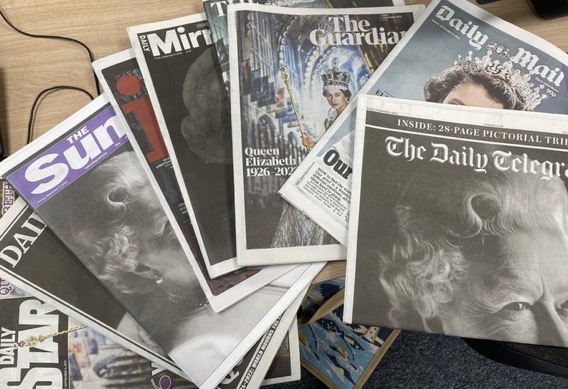
It began around noon with a blizzard of tweets announcing that notes were being passed around Parliament to frontbench MPs with apparently distressing news. Scrolling through my phone while shopping at the grocery store, I had a sense of what might be coming – a long-planned protocol for the event had been in the public domain for years – but the precise timing of the news was nonetheless jarring.
As a Fulbright scholar, completing my degree at the University of Warwick in Coventry, and as a Bucks County Community College and Centurion alumnus, I’ve had a close view of what’s happened since the death of Queen Elizabeth II, head of state of the United Kingdom and the Commonwealth for 70 years.
Among other things, she was the first head of state to use email, the most photographed person in history, and at her death, constitutional monarch for 15 prime ministers, the last of which (Liz Truss) was born more than a century after her first (Winston Churchill).
There had been a sense since the Platinum Jubilee celebrations in June that the Queen had been in ill health. Only days before her death, it was reported that she was too weak to leave Balmoral, the Scottish castle where she spent her last days, and so, new Prime Minister Liz Truss had to be flown there in order to be sworn in.
After news of what was going on in Parliament broke, I immediately put on BBC iPlayer to watch the news on my laptop whilst rushing to finish the final paper for my course. At 6.32 p.m. in the evening, BBC News presenter Huw Edwards appeared in a black suit and tie to announce the death of the Queen.
The effect on the country’s media was sweeping. Opening the BBC Sounds app on my phone, I saw that every single radio channel, from contemporary music to audio drama, were broadcasting the news. All government websites and the sites of organizations ranging from the grocery store Marks and Spencer to the Institute for Economic Affairs think-tank carried remarks marking the announcement.
On the day after the Queen’s death, all the country’s papers – even colorful tabloids such as The Sun and The Star – ran with somber covers bearing an image of her likeness, with The Times, the country’s main paper of record, placing a black banner around the front-page text. These papers sold out quickly – I bought three of them around 10 a.m. and by noon, they had sold out.
Although the Queen’s death has created moving scenes – people have lined up for miles to see her lying in state and have stopped in the middle of a highway and exited their cars to watch her casket transported to London – it has not weighed on every conversation. Most people aren’t in a state of perpetual mourning; even a day after the announcement, talk at the local coffee shop which I regularly visit did not dwell on the news.
Indeed, one week later, there is a clear divide between those that think life should be put off in commemoration of the Queen and those frustrated with the canceling of parties, performances, sporting events, and gatherings. I personally think that carrying on as normal and proceeding with the transition would be the best way to honor the Queen’s dutiful attitude towards life.
There have been several high-profile arrests of anti-monarchist protestors; these have been condemned across the political spectrum, from the right-wing pro-free speech tabloids to London republican (small-r) groups.
As for Charles himself, the most impactful scene I have witnessed thus far is his arrival at Buckingham Palace to deliver an address the day following his mother’s death. Walking past the crowd, he exchanged words directly with individual Britons; there isn’t the same degree of risk to celebrities in the U.K. compared to the U.S. due to the absence of firearms, but his willingness to level with ordinary citizens is probably one reason his popularity has surged since he has taken over.
It will be interesting to see how the new Prime Minister, Liz Truss, and Charles get on together. Charles has been more outspoken than his mother in giving his opinion on government policy, and although Truss is a Conservative, her zeal in reforming the country and skepticism towards historic institutions is an attitude anathema to the more rooted trappings of traditionalist monarchism.
But the degree to which the death of the Queen appears to have resonated with all Britons is something I can’t imagine in America. There is no individual, or perhaps no cause at all, that would drive our politicians to seek less divisive rhetoric, as both Truss and the opposition leader Kier Starmer were apparently advised to do ahead of the upcoming party conferences, as a sign of respect.
Americans may wish sometimes we had a royal family (and certainly pay attention to the British one as though 1776 had never occurred), but it is perhaps for the better that we get to the root of our problems directly, and don’t kotow to imperatives higher than that of the public good as a whole. It is, alas, easier to do so when we can clearly decide – after vigorous debate – on what that good is.

